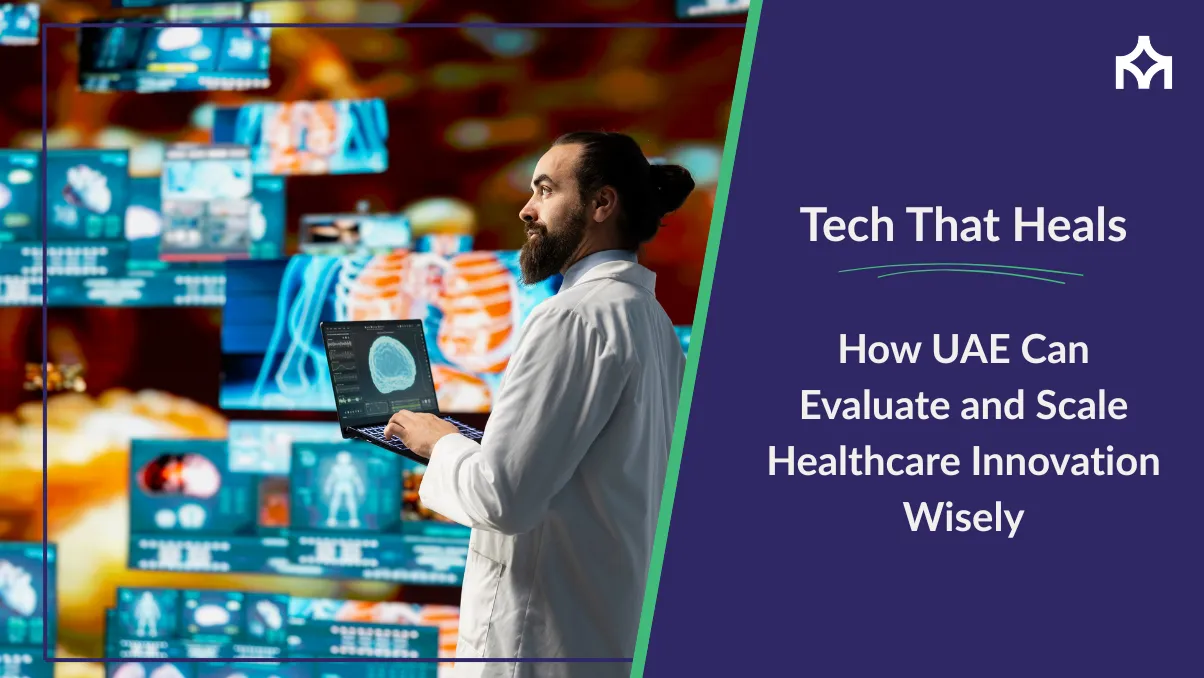The United Arab Emirates (UAE) is undergoing a rapid and strategic transformation in its healthcare system, aiming to become a global leader in medical innovation. Backed by strong public investment, forward-thinking policies, and a commitment to excellence, the UAE is embracing technologies such as AI-driven diagnostics, robotic surgery, telemedicine, and precision medicine to enhance both patient outcomes and operational efficiency.
The foundation is being set for a new era of intelligent, connected, and easily available healthcare, with healthcare spending predicted to increase at an annual rate of 8.5% and the digital health market estimated to rise from $1.06 billion in 2022 to $4.42 billion by 2030.
But innovation alone is not enough. True transformation lies not just in adopting new technologies but in evaluating and scaling them wisely, with a focus on clinical relevance, cost-effectiveness, interoperability, and user adoption.
The Challenges
As the UAE accelerates healthcare modernization, it must also grapple with the complexities of scaling wisely in a fragmented global tech environment. Rapid deployment of unvetted solutions can lead to misaligned systems, provider burnout, wasted investment, and ultimately, disappointing outcomes.
Key questions that UAE health leaders must ask when evaluating new technologies include:
- Clinical Effectiveness: Does this technology demonstrably improve diagnosis, treatment, or safety?
- Operational Integration: Can it work seamlessly with existing workflows, EHRs, and digital infrastructure?
- Financial Impact: Will it reduce readmissions, shorten LOS (length of stay), or optimize workforce efficiency?
- Patient Experience: Does it increase accessibility, especially for rural or underserved populations?
Innovation in Action: The UAE’s Progress
- AI-powered auditing systems and biometric analytics are now in use, thanks to initiatives by the Ministry of Health and Prevention (MoHAP).
- Telemedicine use rose 24% in Dubai alone in 2022, with 129+ hospitals offering remote consultations, dramatically improving access for the 12.2% of residents outside urban centers.
- Abu Dhabi demonstrated its leadership in MedTech by performing the first remotely conducted robotic-assisted prostate cancer surgery in history.
- In 2025, the government set aside AED 5.745 billion, or 8% of the federal budget, for healthcare, highlighting the significance of digital enablement, innovation, and infrastructure.
Despite these milestones, the real challenge remains: How can these technologies be scaled system-wide while ensuring quality, safety, and sustainability?
The Role of Modality Global Advisors In Turning Innovation into Impact
Modality Global Advisors (MGA) offers a proven framework to help UAE healthcare organizations evaluate, integrate, and scale innovations strategically, not just rapidly.
Here’s how MGA supports the UAE’s innovation agenda:
1. Data-Driven Technology Evaluation
- Pre-implementation ROI projections
- Clinical outcome tracking (e.g., impact on LOS, readmission rates)
- Population-specific efficacy validation to ensure global tools meet local needs
2. Predictive Analytics for Targeted Innovation
- Risk stratification tools
- Resource utilization modeling
- AI-powered patient flow forecasting
3. Seamless System Integration
- Middleware development for legacy systems
- Vendor-neutral system architecture
- Clinical workflow integration support
4. Real-Time Monitoring and Continuous Optimization
- Live KPIs for LOS, readmissions, and patient engagement
- Transparent reporting to regulators and stakeholders
UAE's Roadmap: Tech-Enabled, Data-Informed, Human-Centered
To maintain momentum and continue leading on the global stage, the UAE must double down on evidence-based, scalable innovation models. Fortunately, the pieces are already in place:
- Government commitment to data-driven regulation
- Growing talent pool in health informatics and digital health
- Public-private partnerships that combine agility with infrastructure
- Strong global interest from medtech, AI, and pharma leaders
Final Thoughts
In the UAE, the future of healthcare is not just high-tech, it’s high-value. To get there, decision-makers must prioritize technologies that:
- Work for local populations
- Fit into existing systems
- Deliver measurable clinical and financial outcomes
With MGA as a strategic partner, UAE healthcare leaders gain the tools to scale wisely, ensuring that every AI model, robotic system, or remote care platform deployed isn’t just impressive but impactful.
Interested in helping your health system evaluate and scale healthcare innovation wisely? Reach out to MGA today.

